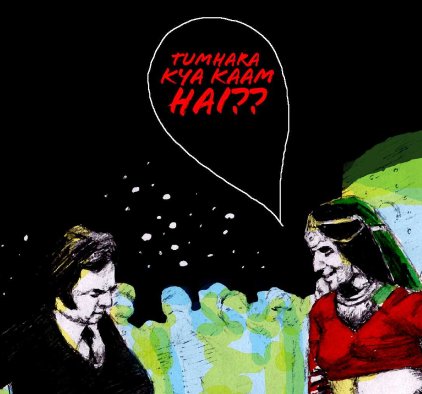
Note 6
At Out of Print, we are receptive to all literary short fiction, so long as it has a tangible connection to the subcontinent. Our issues are generally un-themed. With the exception of June 2011, where we indulged our curiosity on how the mythology of the subcontinent informs contemporary fiction – yielding an issue with extraordinary and exciting narratives – our filters are independent of topic. The interesting thing is that sometimes there is a natural coherence to the stories, a theme that emerges, and sometimes what you get is a collection of stories that we like but have nothing obvious in common.
This December, we have the privilege of featuring a broad range of stories. If we were to try and categorise them I would say they explore the complex, multi-layered aspects of the region, both from a socio-political as well as from an intimate, human point of view, in ways that rise beyond the cultural context. Altaf Tyrewala’s Mischief in Netanagar is a chilling commentary on urban ennui, where the protagonist feels so disempowered that he comments, ‘To belong to the community, to the land or to the nation, a man must first be in possession of himself.’ Tyrewala’s sharp, energetic writing follows a cricket match between India and Pakistan on a quiet afternoon in Netanagar. We are pleased to feature Lucinda Nelson Dhavan for the second time in Out of Print. Her keenly observed Boys And Girls Together leads us to the inevitable consequences of having a refuge for battered women and a lodge for young men next door to each other in a ‘middle-sized, middle-class, sleepy city’ in India. The story evolves through characters that are bold and real. Two stories lift off from the trauma of the independence struggle. Dipika Mukherjee’s Patriots Of The Will, set in 1945,is a fictional rendition of the Indian National Army’s presence in what was then Malaya. A Bengali woman, a sweet maker, makes mishti and much more for Bose. Meenakshi Jauhari Chawla sets her tale of the fallibility of Lakhi Parshad, Member of Parliament in contemporary times. But a reference to Ritwik Ghatak’s Meghe Dhaka Tara draws our attention to the transition from the wounds of partition to the corruption of today, and the wiliness of the human mind in negotiating survival. The two remaining stories in this issue focus on the internal. Drawing on her scientific background, and her theoretical perspective on the ways in which molecules interact, our editor, Indira Chandrasekhar, examines the thought processes of a girl who struggles to make sense of her family and her relationships in Lennard-Jones Potentials. ‘Attract, release, attract, release,’ her mother says, adding, ‘Sometimes those soft bonds are the wisest.’ In Tashan Mehta’s Erasure, which begins, ‘When I left home, I came back to find they had erased me,’ a young woman, desperate to find herself searches among her family and friends but learns that they no longer see her.
The art on the cover of Out of Print 6 is by Vinayak Varma.
